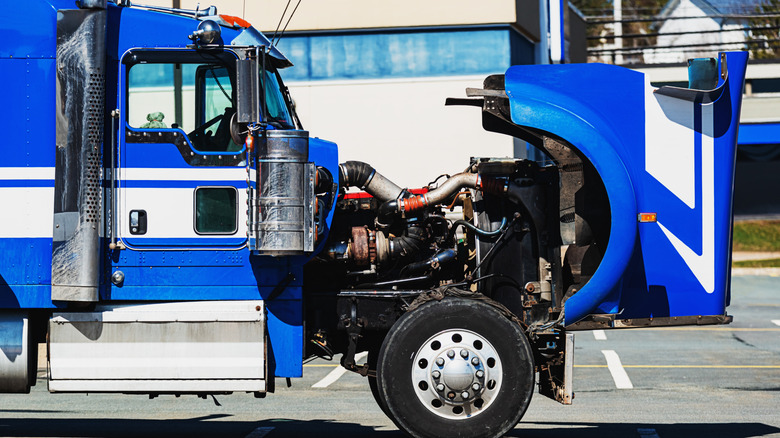Why Semi-Trucks Last Millions Of Miles (But Cars Don't)
Take a ride on any major highway around the world, and you're sure to see a familiar sight: armies of semi-trucks zipping by or trudging along, filled with all the things we buy at our favorite shops. It is the backbone of our modern supply chain in that last final step, from getting goods offloaded at the port and transported to distribution centers. The importance of these fleets of trucks and the commitment of the truck drivers themselves became even more apparent during the pandemic, as supply chain choke points irritated many consumers and politicians alike. These days, things are pretty much back to normal, but you do have to admire the fact that these massive storage units on wheels, clocking thousands and thousands of miles or more, are so reliable.
Many often wonder how exactly, when considering an average car's engine may only last a few hundred thousand miles before the final rev of the cylinders, do semi trucks stay on the road for millions of miles? What's considered "high mileage" to a car owner would be considered normal to a semi-truck owner, as they push well beyond those numbers of total miles driven. Here, we will explore the reasons why semi-trucks seem to have an astounding ability to outlast the cars they share roads with, cruising the highways effortlessly into the million-mile range before retirement or engine failure.
Engineered for endurance
The reasons for a semi-truck's epic longevity are not accidental or from sheer luck; rather, they are intentionally engineered to last long. Heavy-duty use is the purpose for tractor-trailers, and as such, engineers prioritize longevity and reliability, helping to push mileage into the unconceivable million-plus range. Another reason for their epic total mileage is due to the ease of majority highway miles versus rough, stop-and-start city driving. To put it into perspective, William Coe Jr., a Florida native, put a staggering 3,001,276 miles on his long-haul truck between 1986 and 2009, which is considered a world record.
However, it isn't apples to apples when comparing semi-trucks to cars. Cars are literally designed to be written off due to high repair costs, while their engines don't last as long. A 2.0L displacement gasoline engine powering, say, a Honda Civic, is not anywhere close to the power and build tolerances of a 510 horsepower, 12.9L MX-13 diesel, which also costs significantly more. Inherent in a diesel engine design are the larger crankshaft and camshafts, which need more clearance, which, in turn, allows more oil to flow, lessening wear and tear. Next, gear-driven mechanics over a car-engine style timing belt, combined with piston cooling jets that continually spray oil on the bottom of the pistons, help things run smoothly. Lastly, a diesel engine's lower overall RPM, due to its power and torque output from lower revs, means less wear on bearings, pistons, and valves — all contributing to a longer engine's lifespan.
Usage, environment, and maintenance
The key takeaway here is that, beyond being engineered for longevity, combined with an industrial diesel's inherent functionality, it's the maintenance that is a big reason semis seem to last forever. Transport companies with large fleets of trucks will adhere to strict maintenance schedules, as it's in their best interests to keep fluids topped up and filters changed regularly. This in turn maximizes their ROI where they keep trucks on the road longer, ensuring they can meet the demands of customers. Drivers are encouraged to check what they can — tires, brakes, fluid levels, electrical systems, and lights — which can be done easily at stops while on a long haul. These factors become even more important when considering seasonal driving conditions, especially with extreme weather, which can affect a truck's performance.
Semi-truck owners are encouraged to use high-quality replacement parts that meet or exceed OEM standards, especially for pistons, gaskets, liners, and valve train accessories. Not skimping on cheap parts is insurance against breakdowns, allowing diesel truck engines to stand up to the most rigorous hauls required. Keeping the cooling systems topped up, using the correct oil viscosity, or even considering synthetic oil for brutal conditions like extreme heat or massive loads can further protect the heart of the truck. Lastly, using the best quality fuel during trips is recommended. This, combined with having a talented and capable team of technicians at the ready if problems arise, all lead to hitting that million-mile-plus range.


